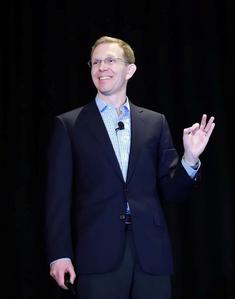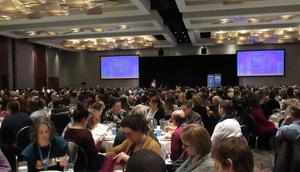"History is littered with winners and losers of reinvention," Ryan Raffaelli, associate professor of business administration at Harvard Business School and self-described "anthropologist for business," told a packed room at yesterday's Wi15 breakfast keynote, "Reinventing the Store: Achieving Growth in the Face of New Business Risks."

|
|
|
Ryan Raffaelli |
|
"For the past 15 years, I have been working with companies that have been faced with technological shock," Raffaelli observed, "but they've had to step back and say, how are we going to reinvent when the world tells us that we either have to hold on or let go."
For businesses at this threshold, two options are in play: to continue to exploit the core product or technology, or to exploit some capabilities while exploring new capabilities, skills and products. "Exploration is about learning," Raffaelli said. "For many organizations it's difficult to do both because the folks who live on the exploitation curve start to resent the people who are thinking about the new curve."
The centerpiece of Raffaelli's presentation was a preview of his forthcoming academic paper on the renewed strength of the independent bookstore channel. "I go deep into an industry," he said. "In your case, for eight years I've been trying to understand why are these independent bookstores beating the odds.... If we think about resilience, this room represents it.... In my mind, nobody's been through more than you."
Using several tools, including archival analysis, field interviews, focus groups, geographical data, field observations and participant observations, he was able to highlight certain core factors in the indie resurgence:
Community: "It's not to say that it wasn't important from the very beginning because it was," he noted. "But here it's about redefining the value for the consumer and what you've been able to do is redefine and reaffirm the importance of community.... One of the things you're most adept at is allowing community to happen through social media, where it goes beyond the store, the idea of community through multiple platforms and channels." He also cited the emphasis on localism, noting that for booksellers, the shop local movement was a proactive, rather than reactive, stance, "communicating the value of why we exist."
 Curation: Raffaelli said booksellers use curation better than any other retailer he has studied: "In fact, it's a term you were using well before it became ubiquitous in retail. The idea that you would carefully select for a customer a perfect book, the one they can't find on the New York Times bestseller list.... This is actually one of the things that helps you compete with the algorithm, that missed human connection."
Curation: Raffaelli said booksellers use curation better than any other retailer he has studied: "In fact, it's a term you were using well before it became ubiquitous in retail. The idea that you would carefully select for a customer a perfect book, the one they can't find on the New York Times bestseller list.... This is actually one of the things that helps you compete with the algorithm, that missed human connection."
Convening: "You have been able to exchange ideas and create places for conversation that become the cornerstone of the community," he observed.
Engagement with other booksellers: "Very rarely do I go to industries where people come together and share all their best practices," he noted. "The fact that this happens is a credit to both the ABA and the regional associations that allow you to come together and share these ideas, but it also allows you to double down on core values.... It's my belief that these processes have been core to the regeneration process that's happened over the past 10 years."
Thin margins, living wages for employees and rising rents were mentioned as prime challenges for the future. Raffaelli also stressed the importance of sharing leading practices and data, noting: "You have to complete your ABACUS surveys.... It's only as a community that you start understanding where the trends are coming from.... ABACUS is one of your core competitive tools."
"In all the industries that I have studied, I have never met more committed employees with a passion for the work that they do because they see it as a calling," Raffaelli concluded, adding that indie bookstores "bring people closer together out of a common set of values that allow them to connect in ways that their couches at home aren't allowing them to, or the computer screens at work are keeping them from. I think now more than ever what the business world can learn from you is the value in community." --Robert Gray

